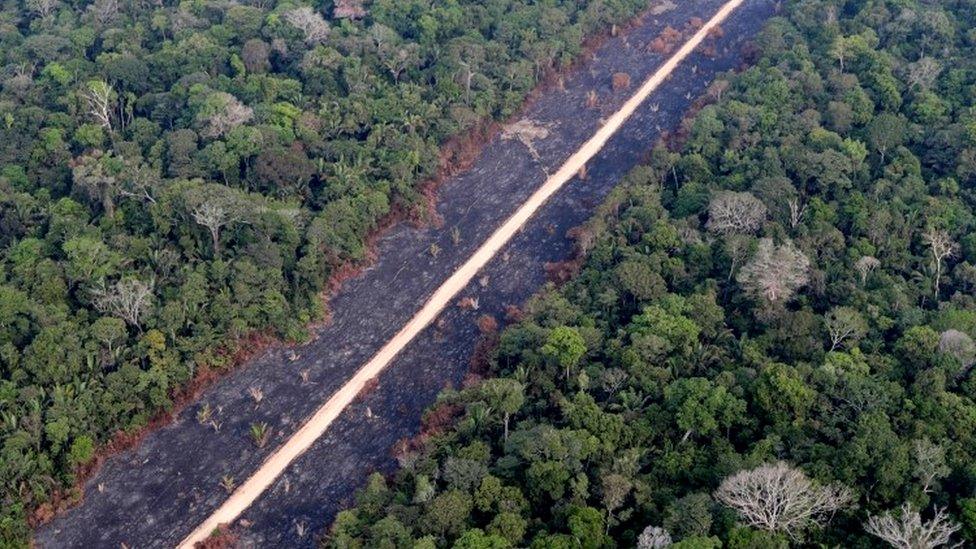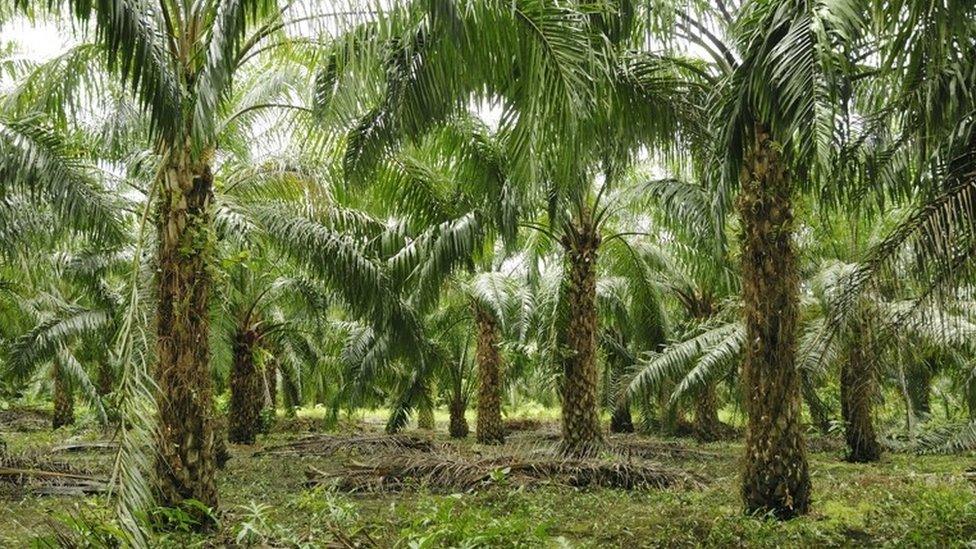Climate change: Protecting the rainforest through your shopping basket
- Published

A road cuts through burnt Amazon rainforest in Brazil
New laws should help prevent consumers from buying food grown on rainforest land that has been illegally logged.
UK firms will be banned from selling commodities if their production breaches local laws protecting forests and other natural areas.
The change will be included in a new Environment Bill that MPswill discuss.
The aim is to stop British consumers playing an inadvertent role in an environmental crime through the goods in their supermarket basket.
The key commodities most grown on land that is illegally cleared are:
cocoa
soya
palm oil
beef and leather
rubber
timber
pulp and paper
It is estimated that around half of tropical deforestation is illegal - and linked to the expansion of commercial forestry and agriculture, with land being cleared to make way for grazing animals and growing crops.
That matters to humanity because rainforests are vital for absorbing climate-heating emissions, their diverse species, their capacity to store water and their potential for new medicines.

Palm oil plantations have led to a loss of rainforest
The government has agreed the UK must stop metaphorically "importing" the problem of deforestation. Its move has been welcomed by environmentalists, but they raise questions whether it will be possible to trace all products. They also ask what level the fines will be, and how the law will be enforced.
Ruth Chambers, from the umbrella group Greener UK, said “This is really a great step to protect rainforests – but we don’t know the full details yet.
“The other issue is that this ban only refers to illegally deforested land… in some countries forest protection is so weak that rainforests are being felled legally. What will the government do about that?”
Other green groups said much more was needed to halt rainforest loss.
The government’s decision follows recommendations from the independent Global Resource Initiative Taskforce, which consulted more than 200 businesses and organisations.
'Zero deforestation'
It said the UK should work in partnership with other countries and support farmers to transition to less damaging forms of farming.
International Environment Minister, Lord Goldsmith, said: “In every conceivable way we depend on the natural world around us. Protecting rainforests must be a core priority.
“Our new due diligence law is one piece of a much bigger package of measures that we are putting in place to tackle deforestation.”
Sir Ian Cheshire, chairman of the taskforce, said: “We are at an extraordinary inflection point – governments are having to invest in recovery and have choices about how to invest to build back better.
"One of the ways we can do this is through our supply chains and what we buy.
“The government recognises the responsibility of the UK to ensure we are not importing deforestation and contributing to further environmental crisis.”
Supermarkets have played a part in the global taskforce.
Tesco chief executive Jason Tarry said: “This aligns with Tesco’s goal of zero deforestation. We hope this encourages all businesses to do the right thing.”
The government will welcome the positive reaction of green groups towards this addition to the Environment Bill.
Ministers have been at loggerheads with green campaigners and the Lords over their refusal to enshrine in law that imported food stuffs should match the standard of foods from British farms.
Follow Roger on Twitter @rharrabin